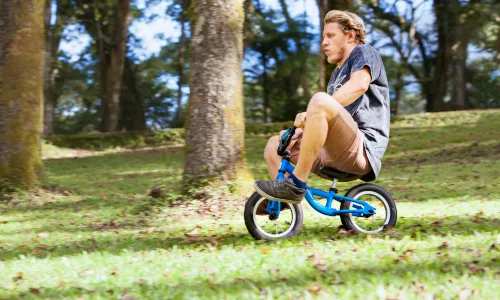
Trust Your Gut (Except When You Shouldn’t)!
Well, howdy! Did you forget about me? I haven’t forgotten about you, but this crazy little thing we call ‘Life’ has kept me away from the trusty old keyboard for a while, at least as far as blog writing goes. Regardless, let’s consider that ‘water under the bridge’—or whatever cliché you prefer for ‘let’s move on’—and dive into today’s topic: your gut. Nope, not the kind you might think needs probiotics, but rather your ‘intuition.’
 For starters, have you ever thought, ‘Wait a second, I can do that. Hold my beer!’ and then took off to race your 15-year-old in a footrace, only to discover that your hamstring hadn’t had any beer and certainly hadn’t had time to warm up? Or perhaps when your wife was taking a bit too long to dig a hole for a plant, you grabbed the shovel and ended up spending the next three hours fixing a sprinkler pipe you busted by rushing.
For starters, have you ever thought, ‘Wait a second, I can do that. Hold my beer!’ and then took off to race your 15-year-old in a footrace, only to discover that your hamstring hadn’t had any beer and certainly hadn’t had time to warm up? Or perhaps when your wife was taking a bit too long to dig a hole for a plant, you grabbed the shovel and ended up spending the next three hours fixing a sprinkler pipe you busted by rushing.
Do you wish you had taken a little more time to reconsider the ramifications of your ‘quick and easy’ decisions? I know someone who does, but we’ll spare them the embarrassment by not revealing their identity.
If you have spent any time reading this blog, and if you have, thank you, you know there are some themes here. One: Food. Two: Tay Tay nicknames. Three: References to Daniel Kahneman. Well, have no fear; none of those are going to change. Unfortunately, Daniel Kahneman did recently pass away, so I felt it might be a good time to reflect on some of his work.
In his legendary book, ‘Thinking, Fast and Slow’, Kahneman details the difference between System 1 and System 2 thinking. System 1 is our quick, instinctual, emotional response. System 2, in contrast, is our more deliberate, logical process. Understanding the difference between these systems can not only save us from ‘hold my beer’ hamstring moments and turning a 5-minute task into a 3-hour ordeal but also from spending hours staring at three different ‘white’ swatches, trying to determine which one we like best.
System 1 Thinking
Since I consider myself a lifelong learner—and if you’re still with me—you might be asking, ‘So when should you trust your gut?’ I’ve got you covered.  Here are a few examples:
Here are a few examples:
- When You’re an Expert: If you have spent years in a particular field, analyzing situations and nuances, your gut is not just a feeling. It’s an informed response based on your accumulated knowledge and experience. For example, professional gamblers spend years analyzing odds and body language, which hones their ‘feel’ for when opponents are likely bluffing.
- Weird Social Interactions: We’ve all had those moments where upon meeting someone, we felt instantly connected, as if we were separated at birth, or conversely, we immediately distrusted them. Your subconscious may be picking up on subtle cues. Trusting your ‘gut’ in these moments could lead you to a lifelong friend or can save you from feeling like you are in an episode of ‘Ripley.’
- Fight or Flight: In dangerous situations, we don’t have a lot of time to weigh the pros and cons of our decisions. Your gut reaction to slam the door shut on your Land Rover when a lion charges might just save your life.
You Got It, System 2 Thinking
Ok, let’s be honest: our guts aren’t always right. We all have friends—or maybe we are those friends—who catastrophize the most benign situations or underestimate the risks of what is a ‘guaranteed lock.’ So, here are some examples of when you may want to tell your ‘gut,’ ‘I’m going to need you to sit this one out’:
- Complex Decisions: Imagine your friend, who spends a lot of time on Reddit’s ‘wallstreetbets’ forum, tells you about the next big opportunity: “Doggie Dog” a stock that is being ‘short squeezed’ and has hit an all-time high. Instead of rushing in, this might be a perfect time to do a little of your own analysis.
- Emotional Situations: When emotions like anger, infatuation, or anxiety take over, we’re primed to make poor decisions. These moments are sub-optimal for telling your boss what you think about them. Instead, take a moment to listen to ‘Weightless’ by Marconi Union—a track proven to reduce anxiety by 65%—which can give you a chance to engage System 2.
- Uncharted Waters: When faced with a new situation or task, our gut might ‘misread the room.’ This is the time to slow down, analyze the situation thoroughly, and engage System 2 for more thoughtful and optimal decision-making.
 We all need to find balance in our lives, whether it’s the Yin and Yang, the ratio of chocolate to peanut butter, or between System 1 and System 2 thinking. Here are a couple of tips:
We all need to find balance in our lives, whether it’s the Yin and Yang, the ratio of chocolate to peanut butter, or between System 1 and System 2 thinking. Here are a couple of tips:
- Develop Your Own Self-Awareness: Recognize when you are putting too much peanut butter with your chocolate or relying too heavily on your System 1 thinking. These types of hasty decisions often can leave us with a sugar high or emotionally charged, leading to regret.
- Embrace a Process: When faced with a big decision, we can always step back. Consider building a list of pros and cons, or simply allow a few days for your mind to settle before deciding that more peanut butter is indeed better.
Putting a bow on this.
Knowing when to trust your gut and when to rely on what we often perceive as ‘rational’ thought is more art than science. It can be the difference between a ‘hold my beer’ moment and a ‘hold on, I need to overthink this’ scenario, or the choice between buying a ‘1987 Suzuki Samurai South Beach Edition‘ and identifying the next Apple stock. Good luck!
Till Next Time.

Love it!! But where was the Tay Tay nickname?
Your adoring wife